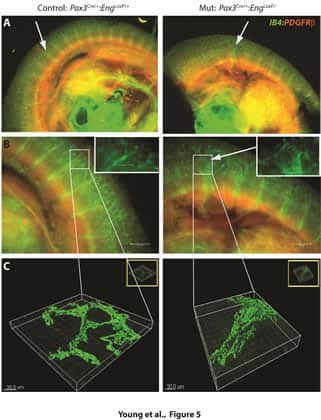Calvin Vary, PhD
Faculty Scientist III
Center for Molecular Medicine
Vary Lab
Understanding on the roles of receptor signaling in cardiovascular development and disease.
Regulation of Blood Vessel Formation and the Etiology of HHT
 Blood vessel formation is a multi-step process. Endoglin is a TGFβ/ bone morphogenetic protein (BMP) coreceptor for the TGFβ/BMP receptor, ALK1, both of which are required for angiogenesis. In humans, haploinsufficiency of endoglin or ALK1 results in Hereditary Hemorrhagic Telangiectasia (HHT), a vascular disease characterized by a loss of arteriovenous identity and aberrant vSMC incorporation in fragile vessels.
Blood vessel formation is a multi-step process. Endoglin is a TGFβ/ bone morphogenetic protein (BMP) coreceptor for the TGFβ/BMP receptor, ALK1, both of which are required for angiogenesis. In humans, haploinsufficiency of endoglin or ALK1 results in Hereditary Hemorrhagic Telangiectasia (HHT), a vascular disease characterized by a loss of arteriovenous identity and aberrant vSMC incorporation in fragile vessels.
Our research is focused on the roles of TGFβ/BMP signaling via endoglin and ALK1 in cardiovascular development and disease. Our work takes advantage of our state-of-the-art mass spectrometry core facility. Recent discoveries include BMP9-directed changes in endothelial cell protein chemokine signatures, including the regulation of SDF1 and MCP1 by BMP9 (Young et al., Blood, 2012) and BMP9 signaling crosstalk with the Hippo pathway, a regulator of endothelial cell mechanotransduction (Young et al., PLOS ONE 2015).
More recent interests include: 1) the interaction of the BMP and Notch signaling pathways in endothelial cell signaling, 2) the requirement for endoglin in embryonic vascular patterning carried out by Pax3-positive vascular cell progenitor cells (See Figure, “Targeted deletion of endoglin in Pax3-positive cells; e9.5 mouse embryonic intersomitic vessels), and 3) the role of BMP9 in the regulation of lipid metabolism.